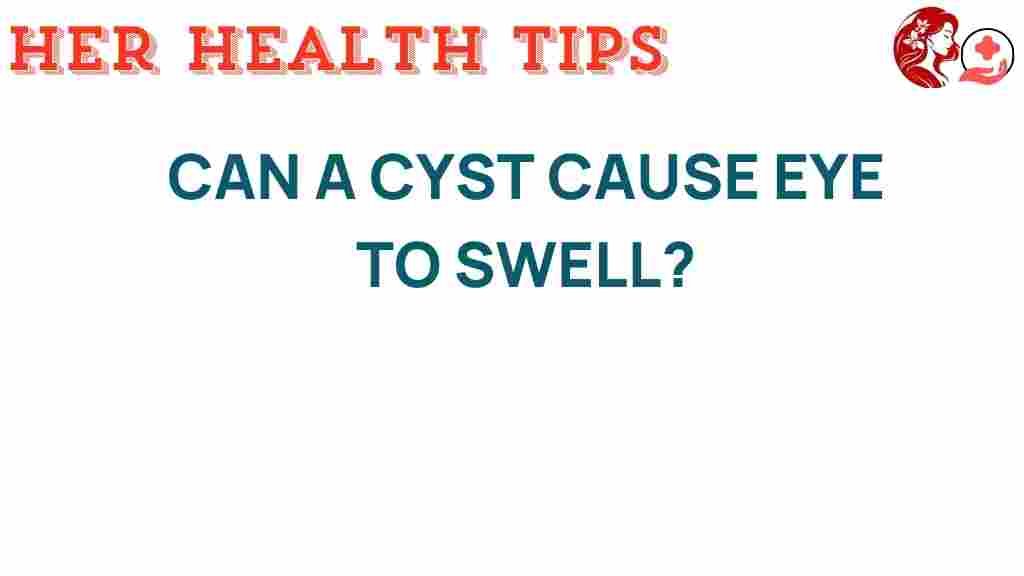Unveiling the Mystery: Can a Cyst Cause Eye Swelling?
Eye swelling can be a perplexing and distressing condition, often leading individuals to seek answers about its causes. One potential culprit that many may overlook is a cyst. In this article, we will delve into the relationship between a cyst and eye swelling, exploring symptoms, diagnosis, treatment options, and the importance of health awareness in ophthalmology. By the end, you’ll have a comprehensive understanding of how cysts can affect your eyes and what steps to take if you experience these symptoms.
Understanding Cysts
A cyst is a fluid-filled sac that can develop in various parts of the body, including the skin, organs, and even the eye. Cysts can be benign (non-cancerous) or, in rare cases, malignant (cancerous). When a cyst forms in or around the eye, it can lead to noticeable symptoms, including swelling.
How Do Cysts Cause Eye Swelling?
Cysts can cause eye swelling through several mechanisms:
- Pressure on Surrounding Tissues: A cyst that forms near the eye can exert pressure on nearby tissues, leading to inflammation and swelling.
- Inflammation: The body may react to a cyst with inflammation, causing the tissues around the eye to swell.
- Infection: If a cyst becomes infected, it can lead to more severe inflammation and eye swelling.
Symptoms of Eye Swelling Related to Cysts
When a cyst causes eye swelling, several symptoms may arise:
- Visible Swelling: The most apparent sign is swelling around the eye, which may be localized or more extensive.
- Redness: The skin surrounding the eye may appear red or inflamed.
- Pain or Discomfort: Patients may experience pain, tenderness, or a feeling of pressure.
- Changes in Vision: Depending on the location of the cyst, there may be temporary changes in vision.
- Discharge: In the case of an infected cyst, there may be discharge from the eye.
Diagnosis of Eye Swelling Due to Cysts
Accurate diagnosis is crucial in determining whether a cyst is the cause of eye swelling. Here’s how healthcare professionals typically approach this:
- Medical History: The doctor will begin by taking a detailed medical history, including any previous eye conditions or cysts.
- Physical Examination: A thorough examination of the eye and surrounding structures will be conducted.
- Imaging Tests: If necessary, imaging tests such as ultrasound or MRI may be ordered to visualize the cyst’s size and location.
If you’re experiencing persistent eye swelling, it’s essential to consult an ophthalmologist for an accurate diagnosis and proper care. You can learn more about the role of ophthalmology in diagnosing eye conditions here.
Treatment Options for Cysts Causing Eye Swelling
Treatment for a cyst that causes eye swelling depends on several factors, including the cyst’s size, location, and whether it is causing significant discomfort or vision issues. Here are common treatment options:
- Observation: If the cyst is small and not causing significant problems, the doctor may recommend simply monitoring the condition.
- Medication: In cases of inflammation or infection, medications such as anti-inflammatory drugs or antibiotics may be prescribed.
- Drainage: If the cyst is large or painful, a healthcare professional may opt to drain the cyst to relieve pressure and swelling.
- Surgery: In some cases, surgical removal of the cyst may be necessary, especially if it is recurrent or bothersome.
Preventing Eye Swelling from Cysts
While not all cysts can be prevented, there are several steps you can take to minimize the risk of eye swelling:
- Maintain Good Hygiene: Keep the eye area clean to prevent infections that can lead to cyst formation.
- Avoid Eye Irritants: Limit exposure to allergens and irritants that may cause inflammation.
- Regular Eye Check-ups: Schedule regular appointments with an eye care professional to monitor any existing conditions.
When to Seek Medical Attention
It’s vital to know when to seek medical help regarding eye swelling. You should consult a doctor if you experience:
- Severe swelling that worsens over time
- Pain that is not relieved by over-the-counter medications
- Changes in vision
- Signs of infection, such as discharge or fever
Troubleshooting Tips for Managing Eye Swelling
If you’re dealing with eye swelling, here are some troubleshooting tips to manage your symptoms while waiting for medical attention:
- Cold Compress: Applying a cold compress to the affected area can help reduce swelling and discomfort.
- Over-the-Counter Pain Relief: Non-prescription pain relievers may provide temporary relief from discomfort.
- Stay Hydrated: Drinking plenty of water can help reduce inflammation and support overall health.
Conclusion
In conclusion, cysts can indeed cause eye swelling, leading to a range of symptoms that may require medical evaluation. Understanding the potential causes, symptoms, diagnosis, and treatment options is crucial for anyone experiencing this condition. If you notice persistent swelling around your eyes, don’t hesitate to seek professional help. Awareness of the relationship between cysts and eye swelling is essential for maintaining your eye health and overall well-being.
For more information on eye health and related topics, visit this resource.
This article is in the category Conditions and created by HerHealthTips Team
